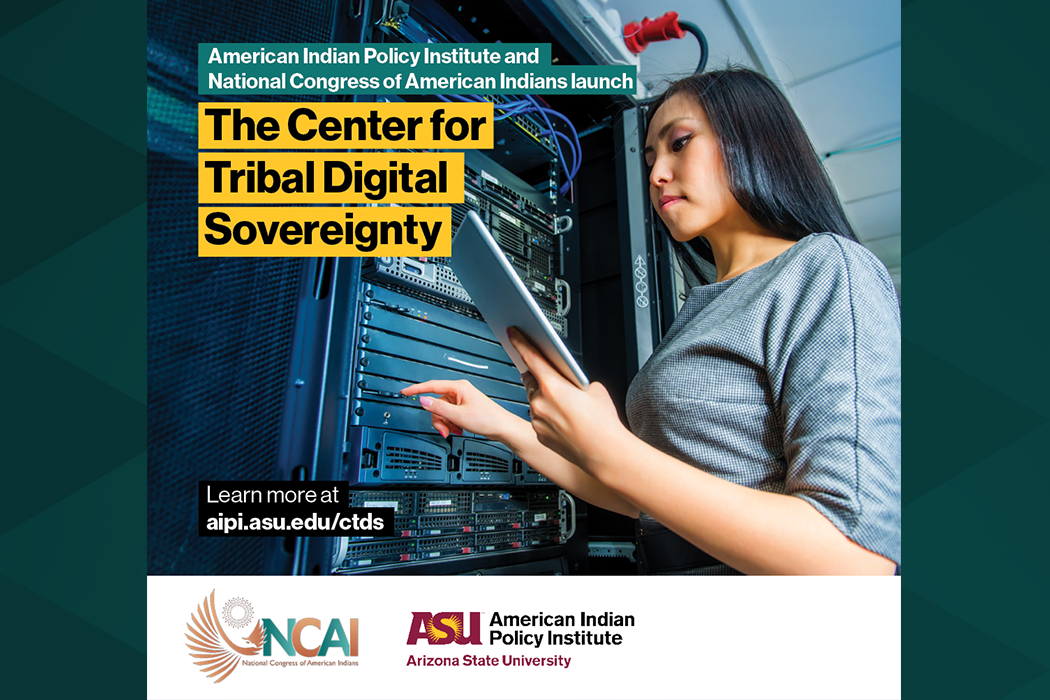
FOR MORE INFORMATION, CONTACT:
Kourtney Kelley
Assistant Director of Communications
Sandra Day O’Connor College of Law at Arizona State University
Jantzen Hale
Media Relations Specialist
National Congress of American Indians
FOR IMMEDIATE RELEASE
Digital sovereignty encompasses all aspects of a Tribal Nation's digital plan and footprint, such as Tribal codes, managing data protection, digital equity, network infrastructure, development of funding sources, and capacity building.
There is no single Tribal Digital Sovereignty plan that fits the unique needs of all 574 federally recognized Tribal Nations and no central resource network for managing their digital footprint. The Center for Tribal Digital Sovereignty will offer comprehensive expertise and a clearinghouse of information to support Tribal Nations in developing personalized digital sovereignty plans with long-term solutions.
The Center for Tribal Digital Sovereignty provides research and scholarship, capacity-building support, and will form a coalition of expert community-serving organizations with long histories of working in this space, creating a gravitas of service as an open-source information resource and clearinghouse for Tribal Nations on Tribal Digital Sovereignty planning. With initial seed funding from the Ford Foundation and Google.org, the Center for Tribal Digital Sovereignty will form a coalition of organizations and entities that have been invited through a review process. Membership in the coalition will be determined based on alignment with the core values of the American Indian Policy Institute and the National Congress of American Indians – which are to serve Tribal Nations, advance Tribal sovereignty, and remain neutral with regard to Tribal network and technology choices.
To further bolster its mission and impact, the Center is actively seeking support from foundations and partners committed to advancing Tribal sovereignty and digital equity. Interested philanthropic partners are invited to reach out to the NCAI Foundation or the ASU Foundation.
###
About the National Congress of American Indians
Founded in 1944, the National Congress of American Indians (NCAI) is the oldest, largest, and most representative American Indian and Alaska Native organization in the United States. NCAI advocates on behalf of tribal governments and communities, promoting strong tribal-federal government-to-government policies. NCAI promotes an understanding among the general public regarding American Indian and Alaska Native governments, people, and rights. For more information, visit www.ncai.org.
About the American Indian Policy InstituteThe American Indian Policy Institute (AIPI) is an Indigenous-led and staffed research institute at the Sandra Day O’Connor College of Law at Arizona State University whose work supports Tribal communities and Indigenous peoples nationwide. We do this by creating academic research focused on key issues in Indian Country, by analyzing and developing policy research and recommendations on those issues, and by building capacity within an ecosystem of lifelong learning. AIPI’s research expertise and focus are substantively on broadband technology and digital equity, with expertise in tribal telecommunications, communications policy, and newly emerging systems as they impact sovereign Tribal nations.
About the Sandra Day O’Connor College of Law at Arizona State University
The Sandra Day O'Connor College of Law at Arizona State University is a leading institution at the forefront of legal education, research and service. Located in Phoenix, Los Angeles and Washington, D.C., ASU Law provides a dynamic learning environment enriched by its proximity to legal, governmental and business communities. With a commitment to innovation and inclusivity, ASU Law offers a diverse range of degree programs, including the Juris Doctor, Master of Laws, Master of Legal Studies, and Master of Sports, Law and Business. ASU Law is dedicated to creating the next generation of legal professionals. Honoring the legacy of Justice Sandra Day O’Connor and charged with upholding her namesake, graduates are well-prepared to shape all aspects of the legal field from public service to private practice, to fields that work in and around the law. For more information, visit law.asu.edu.
